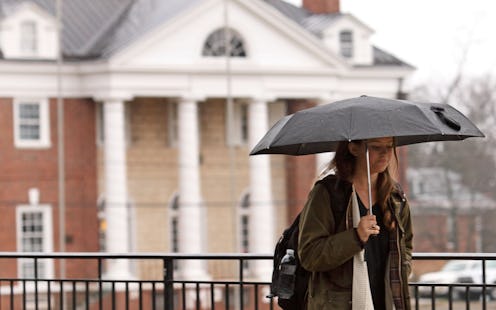As an alum of the University of Virginia who was happy to see the efforts the school has started to make to combat sexual assault, the recent controversy surrounding the Rolling Stone article "A Rape On Campus: A Brutal Assault And Struggle For Justice At UVA" has been especially frustrating. The well-known publication retracted its article this past Thursday, tacking on a note (which some are calling blatantly victim-blaming) claiming that they had "misplaced their trust" in Jackie, the anonymous rape victim whose story was at the center of the original article. The consequences of the debacle are already widespread—and seemingly nowhere near ending, particularly now that journalist Charles C. Johnson is threatening to expose the identity of Jackie and her accused rapists.
Frankly, the storm of backlash against Jackie he has generated on Twitter about it is both scary and incredibly disturbing, especially because it is mostly unfounded. What we know so far from the statement from the Rolling Stone is that after background checking post-article, they were not able to verify the events and locations of Jackie's claims. They did not, however, claim that the rape did not happen, which makes the savage remarks of Johnson claiming that she needs to be "punished" even more horrifying.
The consequences of the Rolling Stone's retraction have already caused a huge setback in the treatment and regard for rape victims. By discrediting and blaming Jackie for their inaccurate journalism, they made all rape victims look less credible and made it more acceptable for people like Johnson to accuse them this way—not to mention that the publication was not forthright with this very important fact: Jackie asked to be omitted from the article before it was published.
Johnson, the journalist who is now apparently has a vendetta to expose Jackie by the end of Sunday night, is not only perpetuating the stigma against rape victims, but is "punishing" the wrong source. It's possible that Jackie may have lied (it's also at least as likely that she didn't; there are so many possible reasons for the discrepancies), but it's Rolling Stone that published this article and should take responsibility for what was said in it. It is not her integrity that is on trial here, but the people who allowed the article to run with whatever inaccuracies there are.
Furthermore, everything Jackie said to them was on strict terms that it remain anonymous, both in terms of her identity and those of the alleged attackers. Compromising her identity is not only uncalled for, but will prevent actual victims of rape from coming forward in the future and make circumstances faced by rape survivors even worse.
Despite Rolling Stone claiming responsibility for the inaccuracies in an edited note this morning, Johnson still seems to be looking for "truth" in all the wrong places:
Unfortunately, Johnson's tweets have generated even more savage comments of people chiming in:
I'm not even sure if we can call this kind of behavior "journalism," neither in the case of Johnson nor Rolling Stone. Both have failed rape and sexual assault victims with their damaging words and actions this week.
EDIT: The original version of this post included tweets containing Jackie's last name, which were removed because we don't play that game over here.
Images: Getty Images; Twitter
